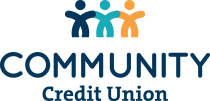Money management is less of a struggle when a reliable system is used to track personal income and expenses. Trying to keep up with the due dates for next months credit card, insurance, utility, and even the occasional vet bill can make the most committed budgeter want to throw in the towel. A checking account is one tool that can get you back in the financial fight while providing other advantages for those hoping to take control of their financial futures. But, selecting a checking account that supports your money goals takes more thought than simply choosing the default account offered by a financial institution.
Here’s what you should know before opening your first (or next) checking account.
Checking accounts are a secure place to deposit your money.
Hiding large bills under your mattress or in a fake soup can is no longer necessary or practical. Funds held at a credit union insured by the National Credit Union Association (NCUA) are protected for up to $250,000 per individual depositor. Locate the NCUA insurance logo before you open an account. NCUA signs are typically found at the entrance to the credit union.
Even if you don’t write checks, you still need a checking account.
Checking account holders have the ultimate time-saving, money tracking system at their fingertips. With the ability to have each paycheck direct deposited into the account and pay bills using the financial institution’s online bill payment system, account holders can skip the teller drive-thru and forgo handwriting paper checks to each creditor. Paying bills is as easy as a few mouse clicks. A detailed transaction history, which can be quickly sorted by month and payee, is available 24 hours a day/7 days a week via an encrypted online banking portal.
Overspending with a checking account can throw your budget off track.
Balancing your checking account requires a regular review of deposits and payments. If you mistakenly make a payment for more than your available account balance, your account will be overdrawn. When this occurs, you not only need to pay the original bill but also fees charged by the payee and an overdraft fee charged by your financial institution.
To avoid being hit by these extra fees, account holders can sign up for overdraft protection with a line of credit. This will ensure that payments are made up to a pre-set limit regardless of the balance in your checking account.
Both free and fee-based checking accounts are available.
Financial institutions offer checking accounts with various perks. These might include unlimited check writing, interest paid on minimum balances, and overdraft protection. Basic checking accounts are often available with low opening deposit requirements, no monthly maintenance fees, and Free Visa® Debit/ATM cards. However, as the perks increase, so might the fees. Fortunately, certain fees can be waived if minimum required balances are maintained on the account. Additional perks are often worth the fees and might include higher interest rates paid on balances, surcharge-free ATMs, and overdraft protection.
Some checking accounts offer cashback savings.
Rewards programs aren’t limited to credit cards or retail membership cards. Some financial institutions offer cash back savings when you use the debit card associated with your checking account. For example, Community Credit Union’s Kasasa Cash® and Kasasa Cash® Back Checking offer account holders rewards for meeting minimum monthly qualifications related to account usage. Along with refunds on your ATM fees, it’s possible to earn 2% cash back on debit card purchases with a Kasasa account.
Not every institution offers cash back checking, so ask before you sign up.
The convenience, flexibility, and security of using an NCUA insured checking account makes it easy to see why many financial advisors consider it a necessary component for building a solid financial foundation. Contact a Community Credit Union representative today to open a checking account that meets your financial needs.

